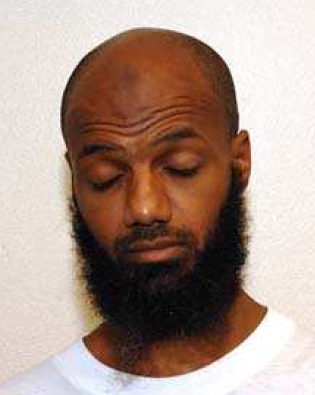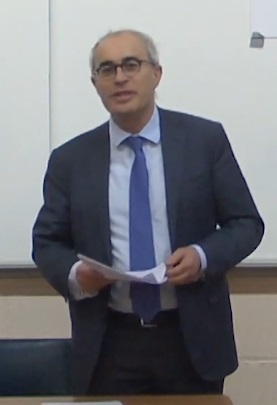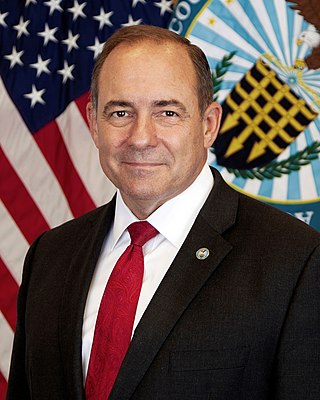
Moazzam Begg is a British Pakistani who was held in extrajudicial detention by the US government in the Bagram Theater Internment Facility and the Guantanamo Bay detainment camp, in Cuba, for nearly three years. Seized by Pakistani intelligence at his home in Pakistan in February 2002, he was transferred to the custody of US Army officers, who held him in the detention centre at Bagram, Afghanistan, before transferring him to Guantanamo Bay, where he was held until January 2005.

Binyam Ahmed Mohamed, also referred to as Benjamin Mohammed, Benyam Mohammed or Benyam Mohammed al-Habashi, is an Ethiopian national and United Kingdom resident, who was detained as a suspected enemy combatant by the US Government in Guantanamo Bay prison between 2004 and 2009 without charges. He was arrested in Pakistan and transported first to Morocco under the US's extraordinary rendition program, where he claimed to have been interrogated under torture.
Bisher Amin Khalil Al-Rawi is an Iraqi citizen, who became a resident of the United Kingdom in the 1980s. Arrested in Gambia on a business trip in November 2002, he was transferred to United States military custody and held until 30 March 2007, in extrajudicial detention in the United States Guantanamo Bay detention camp at its naval base in Cuba. His Guantanamo Internment Serial Number was 906. The Department of Defense reports that Al Rawi was born on 23 December 1960, in Baghdad, Iraq.
Richard Dean Belmar is a British man who was held in extrajudicial detention in the Guantanamo Bay detention camp. He was first detained in Pakistan in 2002 and sent to Bagram Theater Internment Facility, then Guantanamo. He was not charged, and was returned to the United Kingdom on 25 January 2005.
Reprieve is a nonprofit organization of international lawyers and investigators whose stated goal is to "fight for the victims of extreme human rights abuses with legal action and public education". Their main focus is on the death penalty, indefinite detention without trial, extraordinary rendition and extrajudicial killing. The founding Reprieve organization is in the UK, and there are also organizations in the United States, Australia and the Netherlands, with additional supporters and volunteers worldwide.
Extrajudicial prisoners of the United States, in the context of the early twenty-first century War on Terrorism, refers to foreign nationals the United States detains outside of the legal process required within United States legal jurisdiction. In this context, the U.S. government is maintaining torture centers, called black sites, operated by both known and secret intelligence agencies. Such black sites were later confirmed by reports from journalists, investigations, and from men who had been imprisoned and tortured there, and later released after being tortured until the CIA was comfortable they had done nothing wrong, and had nothing to hide.

David Philip Pannick, Baron Pannick, is a British barrister and a crossbencher in the House of Lords. He practises mainly in the areas of public law and human rights. He has argued cases before the Supreme Court of the United Kingdom, the Appellate Committee of the House of Lords, the European Court of Justice, and the European Court of Human Rights.

Sharqawi Abdu Ali al-Hajj, also known as Riyadh the Facilitator, is a Yemeni alleged Al-Qaeda associate who is currently being held in the United States' Guantanamo Bay detention camps, in Cuba.
The Parwan Detention Facility is Afghanistan's main military prison. Situated next to the Bagram Air Base in the Parwan Province of Afghanistan, the prison was built by the U.S. during the George W. Bush administration. The Parwan Detention Facility, which housed foreign and local combatants, was maintained by the Afghan National Army.
Ruzatullah is a citizen of Afghanistan who was held in United States' custody in its Bagram Theater Internment Facility, in Afghanistan.
Jawed Ahmad (Jojo) was an Afghan reporter working for Canadian media outlet CTV who was arrested by American troops and declared an enemy combatant, while working with NATO at Kandahar Airport on October 26, 2007.
Munaf v. Geren, 553 U.S. 674 (2008), is a United States Supreme Court case where the court unanimously concluded that the habeas corpus statute, 28 U.S.C. § 2241(c)(1), extends to U.S. citizens held overseas by American forces subject to an American chain of command, even if acting as part of a multinational coalition. But, it found that habeas corpus provided the petitioners with no relief, holding that "Habeas corpus does not require the United States to shelter such fugitives from the criminal justice system of the sovereign with authority to prosecute them."

Cadder v HM Advocate [2010] UKSC 43 is a decision in which the Supreme Court of the United Kingdom held that the way in which police in Scotland detained suspects was not compatible with the European Convention on Human Rights and was therefore unlawful in terms of the Scotland Act 1998.
In R v Bournewood Community and Mental Health NHS Trust the House of Lords ruled that a man who had been admitted to a psychiatric hospital without capable consent had not been unlawfully detained under the common law. A later European Court of Human Rights ruling, however, found that the man had been unlawfully deprived of his liberty in the meaning of Article 5 of the European Convention on Human Rights.

William K. Lietzau is an American lawyer, former U.S. Marine Corps Judge Advocate, and the current Director of the Defense Counterintelligence and Security Agency.
Yunus Rahmatullah is a citizen of Pakistan arrested in Iraq by British forces in 2004 and then rendered to a US prison in Afghanistan where he was secretly held without charge or trial for at least seven years.

Re B (A Child) or In the matter of B (A child) [2016] UKSC 4 was a 2016 judgment of the Supreme Court of the United Kingdom concerning the habitual residence of a child under English law.

Dundon v Governor of Cloverhill Prison, [2005] IESC 83, [2006] 1 IR 518, was an Irish legal case in which the Supreme Court rejected an appeal against extradition to the United Kingdom by Irish citizen Kenneth Dundon. The case is important in Irish law as Kenneth Dundon was the first man to be extradited under the European Arrest Warrants Act 2003 in Ireland.

F.X. v The Clinical Director of Central Mental Hospital and Another[2014] IESC 1; [2014] 1 IR 280 is a reported Irish Supreme Court case in which the court "clarified two important points about the habeas corpus jurisdiction":
- that the High Court's jurisdiction does lie in respect of detention orders made by courts of coordinate jurisdiction; and
- although the Constitution does not allow for stays to be placed on orders of habeas corpus, "orders can be made for controlling the release of persons who are incapable of protecting themselves."







